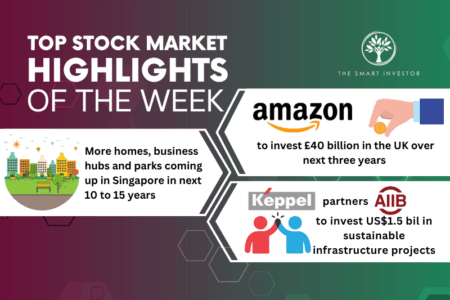Dear Smart Investor,
Around March last year, investors were faced with a strange situation.
Bond yields were at record lows while stocks were rampaging upwards like an unleashed bull.
Valuations were frothy while stock prices in the US reached stratospheric levels as numerous growth stocks flitted with new all-time highs.
The prevailing catchphrase back then was “there is no alternative”, more commonly known by the acronym “TINA”.
TINA symbolised a scenario where investors had no viable option but to continue purchasing stocks to meet their long-term investment goals.
The alternative was cash would get eroded by inflation.
Fast forward a year later, and we are witnessing a sharp decline in both share prices and valuations of these same growth stocks.
The NASDAQ Composite Index has fallen by 13.3% in April alone and is now around 24.4% off its all-time high, plunging the bellwether technology index into its second bear market in as many years.
Some stocks, such as online used car retailer Carvana (NYSE: CVNA) have plunged 81% year to date.
Investors who parked money in Carvana or similar stocks would have seen a substantial portion of their wealth being wiped out.
It’s instructive to consider, at this point, whether there was a TINA effect back when things were going swimmingly well?
Or were there other options that weren’t immediately obvious?
“TINA” Arena
The acronym TINA somehow reminds me of the Australian singer Tina Arena, and one of her song titles, “Heaven Help My Heart”, seems apt in describing the current situation.
Because it’s your “heart” (i.e. emotions) that are at play when faced with a situation where prices keep running higher.
Along with TINA, there is the all-too-familiar feeling of “FOMO”, or fear of missing out.
Together, these two acronyms combine to elicit a powerful emotional response that compels investors to keep pumping money into a stock market that can only seem to go up.
But as we all know, bull markets can and do come to a shuddering halt.
The trigger, in this case, was soaring inflation in the US that hit a four-decade high, and which pushed the Federal Reserve to hike interest rates by the largest magnitude in the last 22 years.
And the rest, as they say, is history.
But there are alternatives worth considering even as stock prices galloped higher.
There were other alternatives
It’s a good thought exercise to ask yourself — where would I have parked my money as share prices ran ahead of fundamentals?
This is a general question that can apply to almost any scenario where you are looking at an investment that seems expensive.
One option is to deploy some cash into income-generating investments that pay out a regular dividend.
REITs immediately come to mind as they are well-known for being dependable dividend payers.
The idea is to park money in REITs to enjoy the regular distributions they offer, and you then have the option of what you wish to do with this additional passive income.
Some examples include Mapletree Logistics Trust (SGX: M44U), which has a strong sponsor in Mapletree Investments Pte Ltd, and Parkway Life REIT (SGX: C2PU), which has increased its core dividend every single year since its IPO in 2007.
Even if REIT valuations were high, you could always take the cash and then invest more into the REIT when valuations came down.
Over time, the compounding effect kicks in as you keep channelling the money back into the same REITs that paid these distributions.
And if the REIT unit prices declined, then you’d end up buying more, similar to a dollar-cost-averaging method of pumping money into investments regularly.
Protecting your portfolio
Another option is to limit your exposure to stocks that you deem expensive.
The way to do this is to size your position smaller relative to the size of your overall portfolio.
For instance, if your portfolio is worth S$100,000, and you believed that Apple (NASDAQ: APPL) may be overvalued, you could dial down your position to just 0.5%, or S$500.
With US$370, it would have bought you around three shares of Apple slightly more than a year ago.
Doing nothing is also an action
Finally, there is always the option to do nothing but sit and wait.
Cash may deliver poor returns, but it becomes a very valuable asset when share prices decline.
This is because cash provides you with the option to scoop up amazing bargains when the cards are down.
But doing nothing when everyone around you is taking some form of action is, once again, tough on the emotions.
The various scenarios outlined above indicate that there were viable alternatives that you could have taken.
TINA may be a popular term bandied around during good times, but it should not distract you from considering these other options to maximise your returns and protect your portfolio.
Fintech is looking ready to take over the market by a huge margin. The trillion-dollar industry is dominating in multiple segments: Buy now pay later, online payments and wire transfers, just to name a few. But where do you start? Join our upcoming FREE webinar “Picking Your Stocks In Fintech’s Trillion-Dollar Growth” and see what’s worth your time and money. Seats are limited, so click here to save yourself a spot!
Follow us on Facebook and Telegram for the latest investing news and analyses!
Disclosure: Royston Yang owns shares of Apple.




